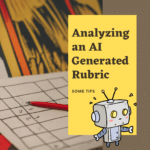What Should be Consumer Math?
Recently I was looking up consumer math online. Specifically, I was looking for a curriculum that utilized spreadsheets. Not that I exhausted all of the options, but many of the ones I looked at were horribly outdated. So what should be included in a consumer math program for the 21st century?
Website
I started a Google Site to brainstorm ideas. Think about our Kindergarteners who will graduate in 2031. Writing checks won’t be a thing then, what types of things will we need to prepare them for? I’ll work on building this into some free resources. If you have any ideas or resources please contribute.
Tweets
“Things my daughter didn’t learn in HS math” #consumermath opening a bank account, applying for financial aid & the risks, managing a college budget while living in the dorms, Loans, taxes, bills etc…..ADD TO THIS LIST #muhsd #masterychat pic.twitter.com/q6DwzOXQhV
— Marcia Carrillo (@MarciaMentor) December 9, 2018
At lower economics levels money orders are still highly utilized. The allure of title and pay day loans present a need to teach the true cost and how to avoid them. I still use checks weekly to pay for lessons for my dtr.
— Heather Hussong (@H_US_song) December 9, 2018
Figuring out health insurance, what is a deductible, who to analyze health plans (give them a type of “family” scenario), how to read and challenge health care bills if they see errors, how to call customer service and elevate concerns appropriately.
— Christine Corrao (@corraolearning) December 9, 2018
Yes purchasing phones vs paying for it monthly? How do you get a FREE gov phone? What phone & plan is best for you, financially? Data? Prepaid? Most Ss are on their parents plans. “When your parent says get your own plan” #consumermath
— Marcia Carrillo (@MarciaMentor) December 9, 2018
Yes. Filling out a W-2, filing taxes & what is a w-4. Can you use an online program to file taxes? Or do you need an accountant? #consumermath
— Marcia Carrillo (@MarciaMentor) December 9, 2018
Christmas time and the real cost of credit! Looking at how small parts of a cheque can really add up when saved! Real cost of not having a #brownbaglunch #consumermath
— Lorna Tremonti (@LornaTremonti) December 9, 2018
Please help #MTBoS #iteachmath I’m making a big change and starting at a new job very soon. This is what I have so far for one of the classes I’ll be teaching. Any resources? Tweeps/Bloggers I should follow? #businessmath #consumermath pic.twitter.com/bLZPKUM72F
— Jennifer Abel (@abel_jennifer) December 20, 2017
Retirement is a must! Effect of starting early with small amounts vs. waiting (even with bigger amounts) #consumerMath
— ⚽️Mrs. Eyton⚽️ (@MrsMathEyton) December 9, 2018
Comparing online mortgage banks. Fix rate, variable rate after X years, total number of years paying, total borrowed, etc… ????
— Oscar Secorún (@TH_OscarS) December 9, 2018
Managing automated payments
— Mike Szczepanik (@MikeSzczepanik) December 9, 2018
Charge everything to your credit card with miles rewards!
— gailmarshall (@gailmarshall) December 9, 2018
How much a 2% fee hits your investments. The rule of 7
— Cathy Keller (@kellerhistory) December 9, 2018
Unit ratios to compare quantities of stuff in shops.
Using algebra and sheets to compare mobile phone contracts.— Owen Martin (@MrMartin2016) December 9, 2018
Online shopping matters i.e tax, postage fee, discount codes etc
— Maths Teacher w Tech (@M_Teacher_w_T) December 9, 2018
Figuring out health insurance, what is a deductible, who to analyze health plans (give them a type of “family” scenario), how to read and challenge health care bills if they see errors, how to call customer service and elevate concerns appropriately.
— Christine Corrao (@corraolearning) December 9, 2018
My students have said taxes: income tax, what’s withheld from paychecks, how much should I withhold, number of dependents to claim.
Digital banking. Keeping a register is still important. Some payment, deposits don’t clear right away. Check to see cash back bonus has been added.— Ashley Cooksey (@AshleyCooksey2) December 9, 2018
Managing the online ATM register, budget, filing taxes, apply for college scholarships, financial aid, @FAFSA #relevance cell phone bills, bank account-how to
— Marcia Carrillo (@MarciaMentor) December 8, 2018
Reading bills and figure out how to budget
— paymentMike (@paymentmike) December 8, 2018
At lower economics levels money orders are still highly utilized. The allure of title and pay day loans present a need to teach the true cost and how to avoid them. I still use checks weekly to pay for lessons for my dtr.
— Heather Hussong (@H_US_song) December 9, 2018
Importance of credit scores and cyber-banking security!
— Erin Kayser (@KayserErin) December 9, 2018
Check out @NextGenPF . Great tools for personal finance. I still teach check writing and balancing a checking account, but use digital tools to do so. As you say, the answer is always spreadsheets. Business teachers are a good resource for you. ?
— Laura Strickland (@lmstrickland) December 9, 2018
Financial aid. Retirement funds….what’s the difference? How to save for retirement when your employer doesn’t help..
— Heidi Knepper (@heidikate1) December 9, 2018
I use a Google Form to track category spending on the go. Later can use a pivot table to track habits and build a budget.
I use TVM calculators to analyze car/house purchases (and retirement planning). All set around possible future careers.
Check ledgers still good to teach.
— Chris Conrad (@conrad_chris) December 9, 2018
Budgeting!!! Paying “yourself” first. Dangers of credit cards. Entrapment of monthly car notes. Payday loans. Cash advances. Not comparison shopping. So much more! #careerprep
— Nicole S. White (@MrsNWhite) December 9, 2018
PayPal and Venmo account options?
— Eva Grace (@evagrace89) December 9, 2018
Compound interest. how it works for you as an investor and against you as a borrower. Saving for something vs borrowing (for a car). The difference in total cost. Though I definitely still need to write checks for things. No register, though.
— Cathy Keller (@kellerhistory) December 9, 2018
I think there needs to be a focus on budgeting and how consumer debt can be crippling. So many college students open credit card accounts (free burger if you fill out an app!) and have no idea how to manage their spending, let alone understand how the cc interest rates work.
— Savanna Powell (@Powell_FM9) December 9, 2018
Comparison online shopping, comparison internet provider shopping, filing taxes, car/house/snowmobile payment plans, saving, how credit card companies make money, understanding how advertising works.
— Sherrie Buchner (@sherriebuchner) December 9, 2018
Digital coupons & checking weekly ads. Budgeting is important, especially for those that have never had to keep track of cash flow.
Types of bank accounts. What interest rate should I expect? CDs, savings, IRAs. How to use to plan for the future.
— Ashley Cooksey (@AshleyCooksey2) December 9, 2018
Focus on living below your means versus living within your means. Focus on using an online management system for payments and money management, but I think briefly check writing should be taught as where I rent they don’t own computers so check or money order must be used.
— Eva Grace (@evagrace89) December 9, 2018
Most checkbook lessons include “deposits in transit” in bank reconciliation. While this is important to know, if you haven’t written a check it does not apply. Most transactions show up immediately. It is very important to teach “pending” and “posted”.
— Mrs.B Teaches (@Mrs_B_teaches) December 9, 2018
Password safety, Budgeting, Google Sheets with formulas for a digital register
— Cara Pavek (@carapavek) December 9, 2018
Investing apps such as acorns or stash, 401k, repaying student loans, car loans, reading credit reports
— Jeremy Arends (@MrArendsEnglish) December 9, 2018
Budgeting, estimation, fee structures, interest rates, spreadsheets
— Kyle Purpura (@kyle_purpura) December 9, 2018
Managing online banking and bill paying, avoiding credit card debt, and shopping interest rates will be necessary #consumermath
— VGP (@bttrflywarrior) December 9, 2018
I recommend teaching Ss how to use online services like @mint and/or @Google Sheets in conjunction with online banking to manage budgets, pay bills, and track spending.
— Michelle Waters – #reThinkELA ? (@watersenglish) December 9, 2018
Q1) Given various levels of income and expenses, how long would it take to save $1M?
Q2) What % of total expenses should each category (housing, food, insurance, etc) be?
Q3) How long would $1M last you by the time you’ve earned it?This involves number sense, estimation, more.
— Michael Roush (@mdroush) December 9, 2018
Maintaining budgets. Understanding the concept of credit and how ‘easy credit companies’ operate. Comparative prices in online environments. Ethical shopping i.e. using critical digital literacies to make conscious choices about products and their origins.
— Kate O’D (@k8ylu) December 9, 2018







